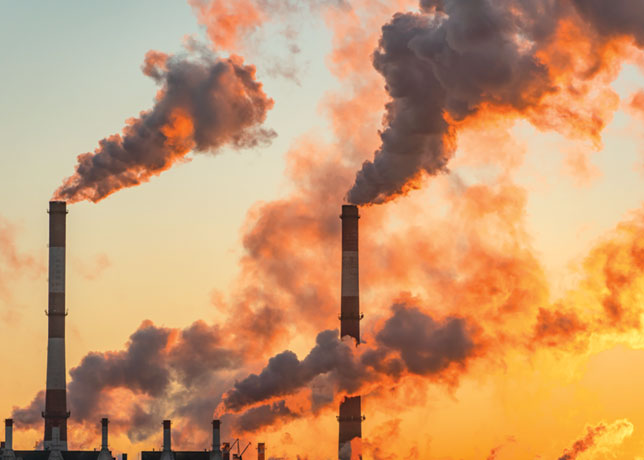
 Rising atmospheric CO2 concentrations are causing severe damage and loss of life
Rising atmospheric CO2 concentrations are causing severe damage and loss of life
The EASAC report suggests that damages from climate-related disasters could surpass mitigation costs sixfold by 2050, and that delaying action will only exacerbate economic losses and humanitarian crises
The escalating climate crisis demands urgent action as scientific evidence paints an increasingly dire picture.
Climate change, biodiversity loss, and resource depletion continue at an alarming rate, outpacing global efforts to mitigate them.
If left unchecked, these trends threaten to destabilise economies, displace populations, and push the planet beyond the point of no return.
The European Academies' Science Advisory Council’s (EASAC) latest report underscores this critical moment, emphasising that decisive policy shifts are needed now more than ever.
"Atmospheric concentrations of CO2 are now passing those in the Pliocene warm period 3.3 million years ago, when temperatures were around 3 deg C hotter and sea levels were 20 m higher," says Professor Michael Norton, lead author of EASAC’s 2025 update of its 2020 Perspective on Transformative Change.
He adds: "Atmospheric CO2 concentrations are continuing to rise and climate change accelerating, causing severe damage and loss of life. Despite substantial progress in green tech, we're still breaking the planet's boundaries, and a shift to an increasingly inhospitable planet may already be underway."
The EASAC report examines the evidence of worsening trends, the inadequate responses, and the urgent need for bold policy action globally, where the EU is already in the lead.
Some of the report’s key findings include:
• Climate deterioration: Greenhouse gas emissions and atmospheric concentrations continue to rise, pushing temperatures higher and leading to more extreme climate-related damages.
• Economic loss: The EU has faced climate-related economic losses of €162 billion over the past three years, with over 60,000 heat-related deaths in the 2022 summer alone.
• Resources are being wasted: Globally, only 7 per cent of resources are recycled, in contrast to the EU where the rate is 50 per cent.
• Biodiversity at risk: We're continuing to lose habitat and species despite the promise of stronger policies to protect biodiversity.
THE REALITY OF SYSTEMIC FAILURE
Six out of nine planetary boundaries have already been breached. And the seventh is about to be breached, too. Despite global promises, crucial policies fall short.
Recent data reveals an acceleration in atmospheric CO2 and methane levels, exceeding previous estimates and challenging climate models that underestimated the speed of change.
The natural land and ocean processes that historically absorbed CO2 are weakening, with forests absorbing significantly less carbon than before, and oceanic carbon sinks showing signs of decline.
This suggests Earth’s systems may be evolving beyond human control, increasing the risk of extreme climate scenarios.
Carbon emissions are on the rise, natural feedback loops spiral downwards, and essential biodiversity targets remain elusive.
Fossil fuel subsidies linger like unwanted houseguests, while GDP-driven models chase quick wins over sustainable gains.
Meanwhile, global material consumption has surged past 98 billion tonnes annually, far exceeding sustainable limits and further eroding planetary stability.
TRANSFORMATIVE POLICIES NEEDED
The report highlights a troubling disconnect: Political will lags behind the crisis. Despite much international attention, legal hurdles, deep-rooted corporate agendas, and fleeting political priorities remain key obstacles. Misinformation and greenwashing efforts stoke the flames of resistance to genuine action.
WHO HOLDS A MATCH TO THE FIRE?
Scientific data reveal that the richest 0.1 per cent of the world's population, who own most of the wealth, resist taxation needed to fund public services and investments.
Yet, they emit 10 times more CO2 than the rest of the richest 10 per cent combined, with a carbon footprint of 200 tons of CO2 per head annually. Then again, the richest increasingly exert political power to further their own agendas.
FIVE POLICY ACTIONS FOR A SUSTAINABLE FUTURE
The EASAC supports international calls from IPBES and others to recognise the severe risks of climate inaction and to implement transformative changes, such as:
• Rethink economic growth: Move beyond GDP-centric growth models toward sustainability-focused well-being indicators.
• End harmful subsidies: Stop fossil fuel subsidies and ensure a just transition to clean energy.
• Protect biodiversity: Enforce stricter regulations on habitat preservation and restoration.
• Promote circular economy: Improve recycling and resource efficiency to increase circularity.
• Base policies on facts: Prioritise scientific evidence over political expediency and special interests in decision-making.
"The EU Green Deal is a step in the right direction - by giving priority to the well-being of its citizens and the planet overgrowth for its own sake," explains Anders Wijkman, Honorary President of the Club of Rome and Member of the International Resource Panel.
"Now, some political groups are suggesting that the pace of transformation should be slowed down. This would be a major mistake. A half-hearted transition will never work. The clock is ticking, and the decisions we take now will steer the course of our planet’s future," he says.
Moreover, EASAC emphasises that delaying action will only exacerbate economic losses and humanitarian crises.
Recent analyses suggest that damages from climate-related disasters could surpass mitigation costs sixfold by 2050.
The shift to a sustainable economy must be a priority, incorporating policies that redefine progress beyond GDP growth, remove perverse subsidies, and enforce stricter environmental standards.
As planetary stability declines, the call for systemic transformation grows louder. The time for hesitation has long passed decisive, science-backed policies are needed to navigate the path toward a livable future.
By Abdulaziz Khattak









































































